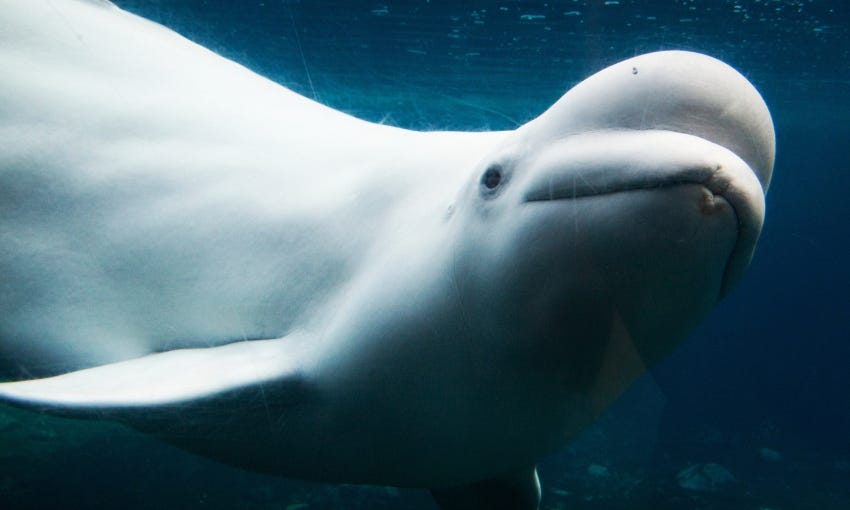A landmark decision for island nations
Greenhouse gases are marine pollution and must be prevented, UN oceans court says.
Kia ora! Welcome to Future Proof. Thanks for joining me! This week: gamifying climate change and beluga whale melons. But first: the world’s top oceans court ruled last week that greenhouse gas emissions count as marine pollution. What does that mean?
It means that countries – including New Zealand – must take action to address climate change under the international law of the sea.
The unanimous decision comes after nine Pacific and Caribbean small island nations asked the Oceans Court (officially, the International Tribunal for the Law of the Sea) to clarify whether greenhouse gas emissions count as marine pollution under an important international oceans treaty.
The United Nations Convention on the Law of the Sea lays out everyone’s rights and responsibilities when it comes to the ocean. It says that states must “prevent, reduce and control pollution of the marine environment”. Human-made greenhouse gas emissions harm the marine environment by causing acidification and rising temperatures. But back when the treaty was adopted in 1982, climate change wasn’t really on anyone’s radar. So, it’s been unclear whether planet-heating greenhouse gases count as “pollution”.
This was the crux of the request posed by the team of small island states: do greenhouse gas emissions count as pollution, and do countries have an obligation to stop them? “The tribunal’s answer was an emphatic yes,” writes Karen Scott, law professor from the University of Canterbury.
The Oceans Court also ruled that simply complying with existing climate agreements won’t necessarily be enough to satisfy the obligations under the law of the sea. This means countries may have to take action beyond what’s required by the Paris Agreement.
The court’s decision, while not legally binding, is “a major milestone for international climate justice,” says Dalila Gharbaoui, climate crisis research fellow at the University of Canterbury. It “could be replicated as precedent for other cases and likely to inform future climate justice cases in national, regional and international courts,” she says.
Because it is non-binding, practical implementation – especially by geopolitically powerful countries still reliant on fossil fuels – is uncertain, Gharbaoui says. But the decision still carries diplomatic weight, and is a “critical step” in acknowledging the “interconnectedness of climate change and ocean health”.
It’s also a big win for small island states, who have contributed little to global heating but are disproportionately impacted by climate change. “This is a historic moment for small island developing nations in their quest for climate justice; an important first step in holding the major polluters accountable, for the sake of all humankind,” said H.E. Eselalofa Apinelu, Tuvalu high commissioner to Fiji.
The nine island nations who brought the case to the Oceans Court are Antigua and Barbuda, Tuvalu, Palau, Niue, Vanuatu, St Lucia, St Vincent and Grenadines, St Kitts and Nevis, and the Bahamas.
Join The Spinoff Welly 500
Last August, The Spinoff hired Joel MacManus as its first-ever Wellington editor.
His agenda-setting editorial project on the future of housing in the city, the War for Wellington, was funded entirely by existing Spinoff members and supported by many new donors.
To sustain and grow our work in Wellington, we now need to ask Wellingtonians for help.
The Spinoff is looking for 500 people to donate $50 or more and join a new community of supporters, The Spinoff Welly 500. Find out more or join today.
Business backs Climate Change Commission assessment
The ambition of New Zealand’s 2050 climate targets should be strengthened, if warranted by evidence, say New Zealand business leaders. The Climate Change Commission is currently gathering feedback on whether to change our target to reach net zero emissions by 2050. The Sustainable Business Council and Climate Leaders Coalition, together representing 160 businesses and more than 40% of GDP, have published their feedback. “We would not support any step back from the country's Paris Agreement contributions, as this would be detrimental to New Zealand's global reputation and the ability of businesses to operate within the global marketplace,” the submission reads. The submission also emphasises the need for real emissions reductions (not just offsets) and supports the inclusion of international shipping and aviation in the 2050 target.
Playing the climate game
A new Minecraft mod called “Heat Wave Survival” has players protecting their virtual village from a “heat dragon” – a physical manifestation of global heating. It’s the latest in a growing string of efforts to engage gamers – of the video, board and role-playing variety – with climate change. For example, one education researcher found that in playing Terraforming Mars with young people, “Nearly every session evolves into a heated debate about diverting resources to make a new ‘Earth’ instead of fixing the one we have.”
Behind the Story is a new podcast from The Spinoff that goes beyond the bylines. Join The Spinoff editor Madeleine Chapman every Saturday as she sits down with a staff writer or contributor to gain more insight about a big story on The Spinoff from the week. Listen now.
More stories
How much of our extreme weather can we chalk up to climate change? Our Changing World takes a look at the new science of climate attribution.
The leftover grounds from your morning cup of coffee could help make cement with a lower carbon footprint.
Top fossil fuel companies’ climate pledges are “grossly insufficient” or “insufficient” on nearly all metrics, according to a report from Oil Change International.
The Detail podcast examines three seabed mining projects and the “startling” lack of information about how damaging they could be.
The iconic moai of Rapa Nui are being eroded by climate-change-fuelled extreme weather.
How walkable is your city? Wellington, Auckland and Christchurch feature in this interactive list from The Economist, showing where in the world people use the most active travel modes, like walking and cycling.
Changes to resource management law introduced to parliament last week would open the door to coal mines on wetlands – like Te Kuha, Newsroom’s Fox Meyer reports.
This keen cyclist built a specialised desk-bike, enabling pedal power to generate electricity for his laptop and wifi.
To finish this edition, beluga whales jiggle their melons to flirt. While they’re known as “wizards with sound” for their impressive array of whistles, clicks and bell chimes, researchers have discovered that these whales may also communicate with their squishy forehead blobs, in a manner akin to our facial expressions. A beluga whale’s melon (yes, it’s a technical term) can be distorted into five distinct “expressions”. This includes the “melon shake”, which is a move often busted out by beluga males when they’re trying to seduce a lady beluga.
Hope you week goes whale,
Ellen
Future Proof is looking for a sponsor!
Connect your brand with an insightful exploration of environmental news, reaching influential readers committed to sustainability and staying informed about the state of our natural world. Contact commercial@thespinoff.co.nz to learn more.
Got some feedback about Future Proof or topics you’d like covered? Get in touch with me at futureproof@thespinoff.co.nz













